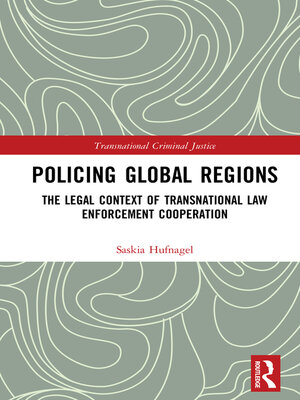Policing Global Regions
ebook ∣ The Legal Context of Transnational Law Enforcement Cooperation · Transnational Criminal Justice
By Saskia Hufnagel

Sign up to save your library
With an OverDrive account, you can save your favorite libraries for at-a-glance information about availability. Find out more about OverDrive accounts.
Find this title in Libby, the library reading app by OverDrive.



Search for a digital library with this title
Title found at these libraries:
| Library Name | Distance |
|---|---|
| Loading... |
This book provides a stocktake and comparative socio-legal analysis of law enforcement cooperation strategies in four different regions of the world: the European Union (EU), North America, Greater China and Australasia.
The work analyses law enforcement cooperation mechanisms within the socio-legal framework of global normmaking. The strategies addressed range from legal frameworks facilitating cooperation to formal and informal police networks and cooperation practices. The study also takes into account crime-specific engagement, for example campaigns focusing on drug crimes, terrorism, financial crime, kidnappings and other offences. It explores challenges in policing practice and human rights protection in each region that could be countered by existing strategies in another. As regions usually develop more advanced cooperation mechanisms than exist at a global scale, strategies found in the former could help find solutions for the latter. To map existing strategies and assess their impact on both human rights and policing practice this study relies on an assessment of the primary and secondary literature sources in each region as well as interviews with practitioners ranging from senior police officers to prosecutors, government officials, customs and military staff.
This book presents a valuable resource for academics and postgraduate students, as well as policing and criminal justice practitioners, government officials and policy makers.







